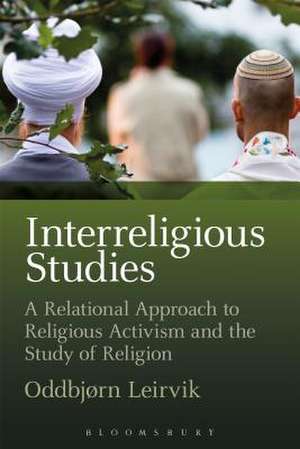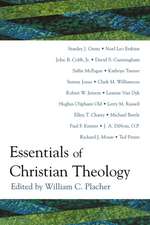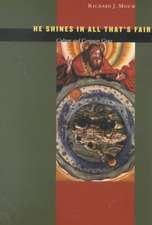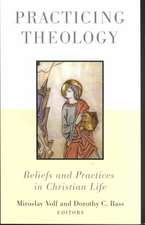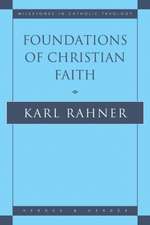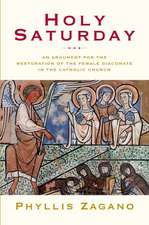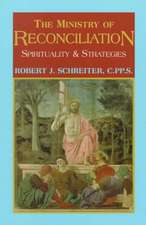Interreligious Studies: A Relational Approach to Religious Activism and the Study of Religion
Autor Professor Oddbjørn Leirviken Limba Engleză Paperback – 15 iul 2015
| Toate formatele și edițiile | Preț | Express |
|---|---|---|
| Paperback (1) | 256.02 lei 43-57 zile | |
| Bloomsbury Publishing – 15 iul 2015 | 256.02 lei 43-57 zile | |
| Hardback (1) | 772.81 lei 43-57 zile | |
| Bloomsbury Publishing – 12 feb 2014 | 772.81 lei 43-57 zile |
Preț: 256.02 lei
Preț vechi: 294.62 lei
-13% Nou
Puncte Express: 384
Preț estimativ în valută:
48.99€ • 51.29$ • 40.54£
48.99€ • 51.29$ • 40.54£
Carte tipărită la comandă
Livrare economică 07-21 aprilie
Preluare comenzi: 021 569.72.76
Specificații
ISBN-13: 9781474254755
ISBN-10: 1474254756
Pagini: 208
Dimensiuni: 156 x 234 x 11 mm
Greutate: 0.29 kg
Editura: Bloomsbury Publishing
Colecția Bloomsbury Academic
Locul publicării:London, United Kingdom
ISBN-10: 1474254756
Pagini: 208
Dimensiuni: 156 x 234 x 11 mm
Greutate: 0.29 kg
Editura: Bloomsbury Publishing
Colecția Bloomsbury Academic
Locul publicării:London, United Kingdom
Caracteristici
First book to map out the field of interreligious studies as a new method
Notă biografică
Oddbjørn Leirvik is Professor of Interreligious Studies at the University of Oslo, Norway. He is co-initiator of the European Society of Intercultural Theology and Interreligious Studies, and has written extensively in English and Norwegian on Christian-Muslim Relations and Interreligious Dialogue.
Cuprins
Introduction: Religious activism, interfaith dialogue, and interreligious studies1. A relational approach to the study of religion 2. Philosophies of interreligious dialogue: practice in search of theory3. Interreligious dialogue and secularity 4. The image of the Other and othering discourses 5. Faith-based diplomacy and interfaith activism: dialogue from above and below6. Tolerance, conscience, and solidarity: globalized concepts in ethical and religious education? 7. Interreligious hermeneutics and the ethical critique of the Scriptures 8. The sacred space between: a relational theology in dialogue with Islam 9. Interreligious studies and interfaith dialogue, in academia Postscript: United against extremism? Appendices: Three Christian-Muslim statementsEndnotes BibliographyIndex
Recenzii
This book is valuable and a scholarly contribution to inter-religious and interfaith dialogue. As many of us in the religious academia are critically engaged to determine the place of inter-religious and interfaith dialogue in the academic study of religion, this book makes a remarkable contribution to this discussion. It will serve as a guide to the interfaith community to learn from the experience of interfaith dialogue in Norway and how to expand on their own.
It is likely to be a landmark text ... providing much for scholars and advanced students to reflect upon, while also being accessible to both serious undergraduate and lay readers ... [It] is likely to be core reading for any involved in the broad field of interreligious studies for a good time to come. It may also be observed that this book is indicative of a growing portfolio of texts in interreligious studies being published by Bloomsbury which is surely a good sign.
Professor Leirvik has provided us with an insightful and stimulating introduction to the emerging field of Interreligious Studies that is likely to be an important and standard work in this area for years to come. Not only does he explain the rationale and background to this new and emerging field, but he also seeks to expand its boundaries and set out a compelling vision for it. At the heart of this is the concept of relationality which is explored with much nuance and clarity. The book draws many important theorists into the debate, and is at the cutting edge of thinking about interdisciplinary and multidisciplinary work in the study of religion, especially at the intersection of fields like theology, Religious Studies, ethics, critical theory, and sociology. All scholars who see their work as in any way related to the growing field of Interreligious Studies will feel indebted to Leirvik for this book.
It is likely to be a landmark text ... providing much for scholars and advanced students to reflect upon, while also being accessible to both serious undergraduate and lay readers ... [It] is likely to be core reading for any involved in the broad field of interreligious studies for a good time to come. It may also be observed that this book is indicative of a growing portfolio of texts in interreligious studies being published by Bloomsbury which is surely a good sign.
Professor Leirvik has provided us with an insightful and stimulating introduction to the emerging field of Interreligious Studies that is likely to be an important and standard work in this area for years to come. Not only does he explain the rationale and background to this new and emerging field, but he also seeks to expand its boundaries and set out a compelling vision for it. At the heart of this is the concept of relationality which is explored with much nuance and clarity. The book draws many important theorists into the debate, and is at the cutting edge of thinking about interdisciplinary and multidisciplinary work in the study of religion, especially at the intersection of fields like theology, Religious Studies, ethics, critical theory, and sociology. All scholars who see their work as in any way related to the growing field of Interreligious Studies will feel indebted to Leirvik for this book.
